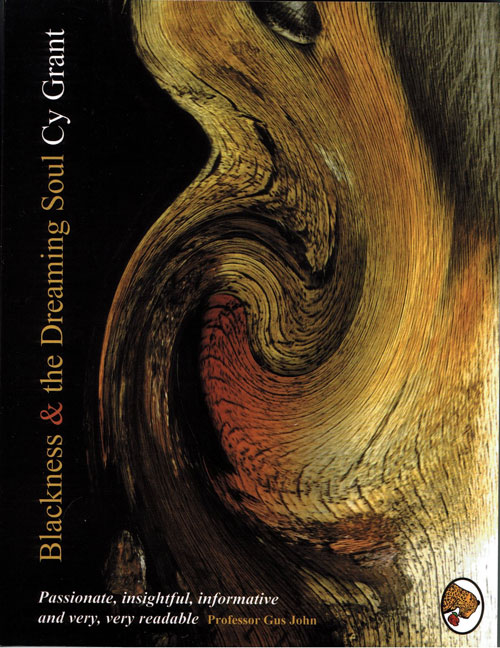Blackness & the Dreaming Soul

Paperback: 232 pages
Publisher: Shoving Leopard (9 May 2007)
From the book Blackness & The Dreaming Soul - A Sense of Belonging : Multiculturalism & the Western Paradigm.
"Visionaries of a new holistic and ecological paradigm are themselves deemed to be neurotic. They have moved out of the society that would have protected them, and into the dark forest, into the world of fire, of original experience. Original experience has not been interpreted for you, and so you have got to work out your life for yourself. Either you can take it or you can’t. You don’t have to go far off the interpreted path to find yourself in very difficult situations. The courage to face the trials and to bring a whole new body of possibilities into the field of interpreted experience for other people to experience - that is the hero’s deed."
Joseph Campbell The Power of Myth
Blackness and the Dreaming Soul is an uplifting account of one man's search for identity and meaning: having been forced to confront culturally imposed feelings of inferiority and anger, the author describes his route to personal transformation. As a long-time West Indian in Britain, Grant writes from that liminal space of insider, perceived as perpetual outsider, his story inviting us to look at what is wrong with the prevailing dominant world culture that seeks to impose upon its subjects its dualism, historiography and disregard for the majority of humanity, leading to the current ecological and spiritual crisis that threatens our very survival.
Part memoir, part cultural negotiation, the book attempts not only to make sense of his worlds, but to propose solutions that are deeply founded and attainable to all. Whilst a POW in Germany, he began this bold exploration into realms that Lewis Mumford called ‘the wilderness that Western man has failed to explore; the dark continent of his own soul’. As the title suggests, this process is inevitably bound up with the quest for inner meaning, sadly so often missing from Western culture today.
The book reads as a set of linked essays, each of which builds upon the previous one. It begins with the account of Grant’s early life in British Guiana, his sojourn as an officer in the RAF in WWII and the disintegration of his Lancaster around him in the skies over Holland, leading to his earliest reflections in the German Stalags. He retrained as a barrister after the War but being black, found no work. Turning to singing and acting to survive, brought him to the notice of the wider public especially via BBC television.
As an actor he faced the dilemma of only being cast in ‘black’ roles, that is, roles where race was an issue, or reflected the perceived status of, or the prejudices towards, black people in society. Following Powell’s ‘Rivers of Blood” speech in 1968, he came to recognise an institutionalised racism never previously apparent despite earlier setbacks. The Civil Rights Movement spurred on his exploration of identity, the ‘dark journey’ into his soul. As an angry black man, he wrote a collection of short poems, several of which were anthologised. These vividly express the dilemma black people face when using language and prepare the ground for the current analysis into how our emphasis on scientific empiricism has trapped us within the language we use.
In 1974, Grant set up DRUM, the first black arts centre in Britain, ironically derided at the time for its ‘separationist’ approach, and almost entirely unacknowledged today by successors which share its fruits.
His last ‘black’ gesture was performing and touring a stage version of Aime Cesaire’s Negritude Movement poem Return to my Native Land. Known for its passionate deconstruction of colonialism, the poem calls for a re-engagement with nature and the emergence of a new man.
The CONCORD festivals, born out of the racial tension of the early 80s, typify Grant’s aim to celebrate cultural diversity in Britain at a time when attempts at social reconciliation were largely ignored. They anticipate his current emphasis on ‘unity in diversity’, a subject he first wrote about in Ring of Steel, the story of the Trinidad steelpan, describing the alchemical transmutation of waste metal into harmonic sound.
As the biographical detail unfolds, the author’s inner journey gradually comes into focus. Much as the alchemical oil-drum becomes ‘pan’, so the surface detail of his life becomes meaning for all. For instance, his lengthy piece on Carnival captures the emphasis on cultural identity, celebration in adversity and the reconciliation of ‘great house’ with ‘the folk’ that comprise the social fabric of West Indians. Columbus’ voyages; the rush towards Genetic engineering; religion and spirituality; issues that are almost never discussed within a holistic framework are reassessed and shown to be vital for understanding our world.
Taoism has long been a major influence on Grant’s thinking and he has broadcast for the BBC on the subject. Tao, the primal energy that permeates the Universe, brings all things into being and reconciles all opposites, contrary to the Western tendency to fragment all knowledge into its constituent parts. Grant subscribes to a holographic Universe, in which everything is embedded in an ‘implicate order of wholeness’ as described by physicist David Bohm; a Universe that is always getting to know itself; that integrates science and spirituality. Grant’s description of the New Physics gives previously unfathomable ideas both a new context and relevance. His straightforward analysis of complex issues renders them available to everyone.
The events of ‘9-11’ were a defining moment in history, polarising our world further. In suggesting ways of rediscovering and developing ancient worldviews, the author challenges us to cut across conventional categories and realise the potential for unity in diversity. He believes that the true direction of the evolution of our species lies not in the survival of the fittest but in the diversity that is the imprint of Creation- we need to develop a reverence for all life. Indeed, recent discoveries confirm that human beings, plants and animals all share the same DNA. He stresses the ‘ultimate connectedness of the inner and the outer… the DNA of a single living cell retains the imprint of the whole person which parallels the smallest atom as a microcosm of the Cosmos’, and ‘being aware of this allows us to re-envisage our true place in the Universe.’
Cy Grant’s story transcends the specialist categories of the conventional bookshelf, opting instead for a reconstruction of the way in which we make our reality. Instead of adopting the mono-culture of globalisation in which duality is enshrined, he seeks to develop a vision of unity in diversity in which all things are connected; man and nature, earth and cosmos. In seeking to recover the ancient worldview, the author believes we will have to acknowledge our history of exploitation and our present rush toward world domination. His book offers us a believable route toward this goal.
